
views
Enjoying Meals Efficiently

Make your own meal. If you are away from home, eating out at a fast food restaurant often seems like a quick and easy way to have a meal when you're busy. However, it takes a lot of time to decide on a restaurant, wait in line to order, then wait for your food to be cooked. If you have prepared yourself a meal ahead of time you can save yourself a lot of time.
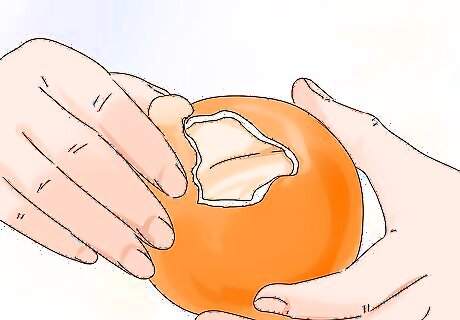
Do your prep work at beforehand. If you are going to eat an orange, peel it and separate the slices in advance and bring them along in a container. When you get home from the store, wash and chop up some vegetables like carrots or celery so you have them ready to go. Prepping your food ahead of time can save you valuable minutes when you don't have much time to eat. If you find you are always short on time in the mornings, prepare your breakfast the night before. Likewise, you might benefit from prepping your food at home if you struggle to find enough time to eat at work.
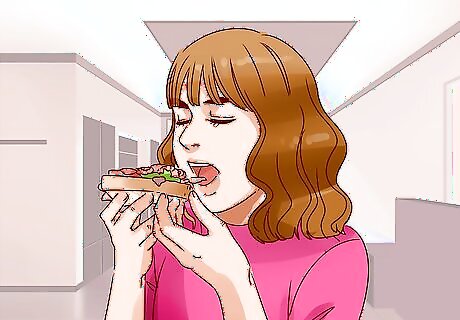
Have a small snack before your meal. It takes approximately 20 minutes for your vagus nerve to stop telling your brain it is not hungry anymore. If you eat your food too quickly your brain will still think it's starving. Eating something small 30 minutes or so before your meal can help shut off those signals. This way you can eat a smaller meal, which will take you less time, and you will still feel happy and full when you finish.
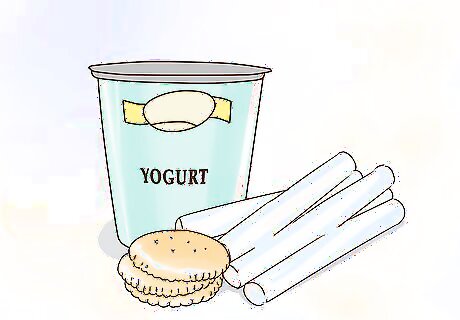
Eat healthy portions of food. Eating fast often leads to eating too much. You can avoid this by only bringing along or ordering a reasonable amount of food. If there isn't too much in front of you, then you can still have a relatively healthy lunch even if you're eating too fast. Look for pre-packaged, single-serving portions of foods like greek yogurt, crackers, and string cheese. These items are all easily transported and can help to moderate your portions.
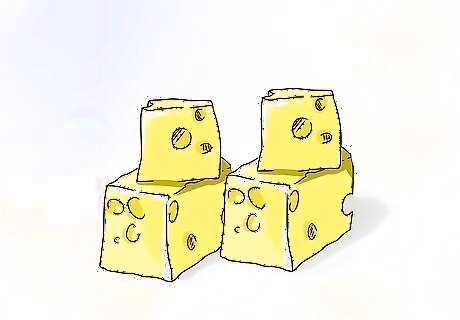
Eat nutritious foods. Stay away from soda, junk food, and sweets and eat a meal full of healthy foods that will give your body the nutrients it needs to get through the day. Hard-boiled eggs can be eaten in a minute or two and are really filling and nutritious. Nuts are also a great, quick snack that will keep your belly feeling full longer than a bag of chips. Cheeses are also filling, healthy and can be eaten quickly. Fruits like apples and bananas can provide a little natural sugar kick and might satisfy your sweet tooth.

Eat some leftovers. When you make food, cook in large amounts. This way you will have some leftovers which can make for a quick and easy meal when you are pressed for time.
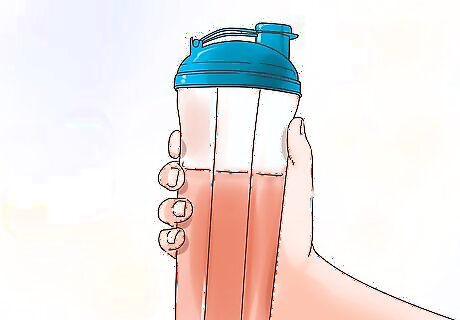
Consider drinking a protein shake as a meal replacement. Protein shakes are quick and easy to make. They can really cut down on the time it takes you to eat a meal. It's also the easiest way to eat on the go if you run out time. Select a protein drink that is rich in protein, carbs, and fats with sufficient calories to satisfy your needs. You may just want to use a shake to replace part of a meal. Supplement the shake with a snack of fruit or veggies to assure you get the necessary nutrients.
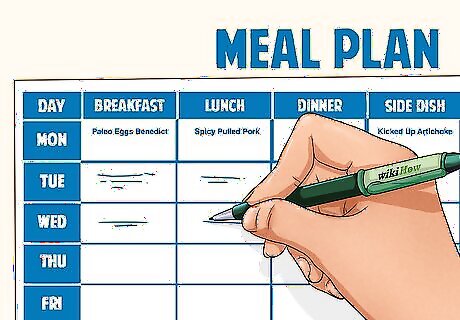
Make the most of your time. Don't focus on getting the food down fast. Instead, get in the habit of planning your meal ahead so you aren't wasting what little time you have to eat. If you prepare your food ahead of time and make good meal choices you can still eat fast and eat well.
Eating Competitively
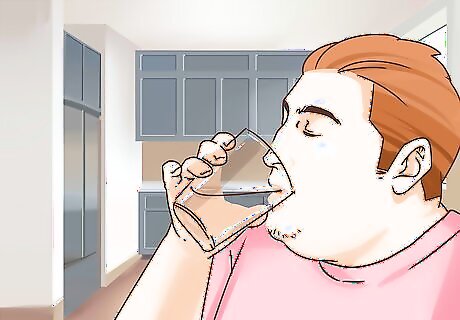
Train with water. Water is the most important training tool to help you eat faster. Try drinking lots of water at once to help increase the amount you can swallow at once. It is safer to start trying to swallow larger amounts with water because there is no risk of choking.
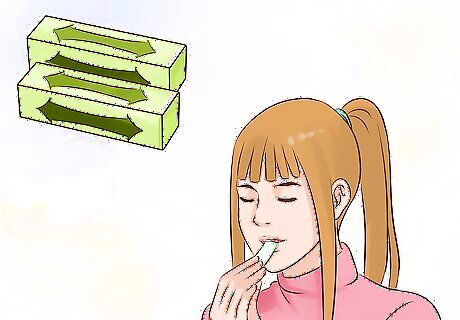
Exercise your jaws. Chew lots of gum at once. Instead of chewing one piece of gum at a time, try chewing the whole pack. This exercise will help build up the muscles you need to chew your food fast. In order to eat fast, you will need to chew fast.

Practice your breathing. Figure out the breathing techniques that will work for you. You may need to take a breath every two bites or three or four. Everyone is different. The best way to figure it out is to figure out your eating rhythm. Once you know what is a good breathing pace for you, keep your focus. Don't let the excitement of the meal get to you and throw you off your rhythm. Then you will have to stop and catch your breath.
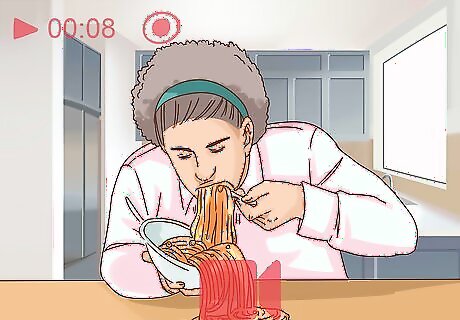
Study some film. Videotape yourself eating and assess your performance. Try to figure out where can you shave a few seconds off your time. You can also check out some professional eating contest to try and pick up some more tips from the pros.
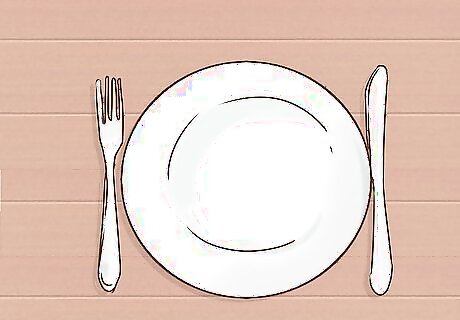
Fast the night before. Avoid eating solids as much as possible for a day or so before your meal. The hunger may give you a little extra motivation to get your meal down faster. You may still want have something small, like a piece of fruit, a few hours before your meal. This will help hold you over, but won't fill you up prematurely.
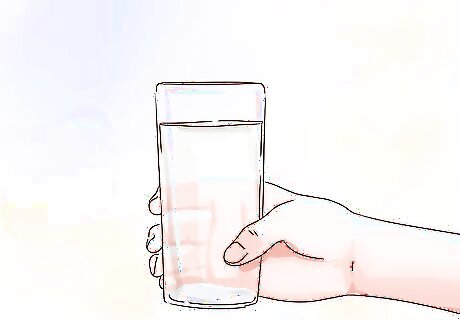
Be sure to have a glass of water handy. Water can help clear the palate and help you digest your food. A small sip will also prevent your throat from getting too dry. However, avoid drinking down all your water as it can fill you up and waste precious time. Just think of it as a food lubricant.
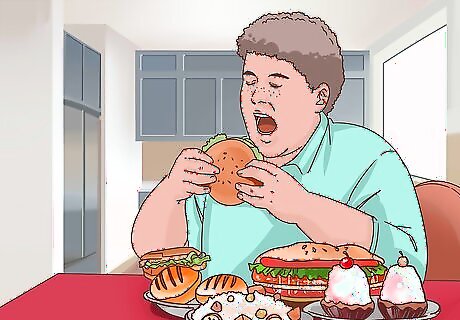
Chew as little as possible. Place large quantities of food into your mouth at once, but only break down the food as much as needed in order to swallow it. You don't want to choke, but you don't want to waste time chewing food unnecessarily either. As soon as you know it won't get stuck, swallow it down so you can move on to the next mouthful. If you are eating something that is bigger than you can fit in your mouth at once, like hot dogs, hamburgers or pizza, figure out the best way to break the food down with your hands to make it faster to eat. For example, you can rip your hot dogs and buns in half and dip them in water to help break down the bread and be able to fit both halves in your mouth at once.
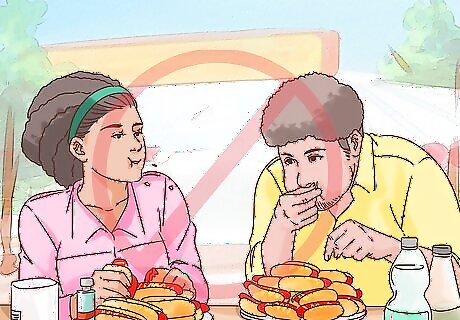
Avoid talking while eating. This will only slow you down and waste your oxygen. Focus on breathing in between bites. Block everything else out.
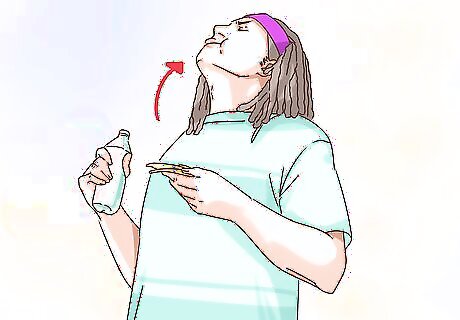
Bounce up and down while you swallow. Use the force of gravity to help the food pass quickly down your esophagus. Tilt your head back so the food can travel down your throat easily. The esophagus is only 2-3 inches on average. After a long enough time training to eat fast, you will be able to slightly expand your esophagus and eat more at once.
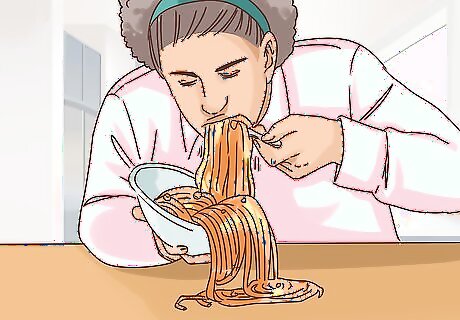
Use your utensils to your advantage. If you're eating something with a spoon, use a large spoon and completely fill it before bringing it to your mouth. If you're eating pasta with a fork, twirl a large amount onto the fork. Try shoveling the food in. This is easiest with a bowl, and you can literally use your eating utensil to shovel large amounts of food into our mouth.

Stuff your face. If you're out of time and there is still food in front of you, just shove it all in your mouth. You can always chew it after the event finishes. The important thing is just to get as much of it in there as quickly as possible.



















Comments
0 comment